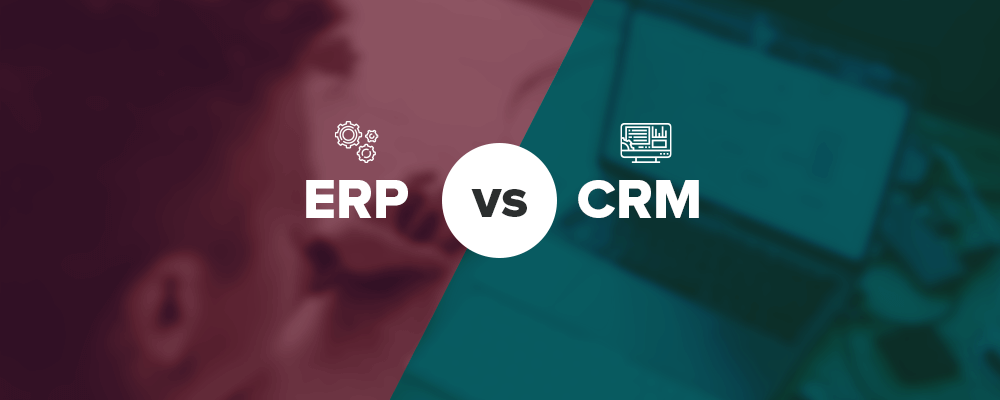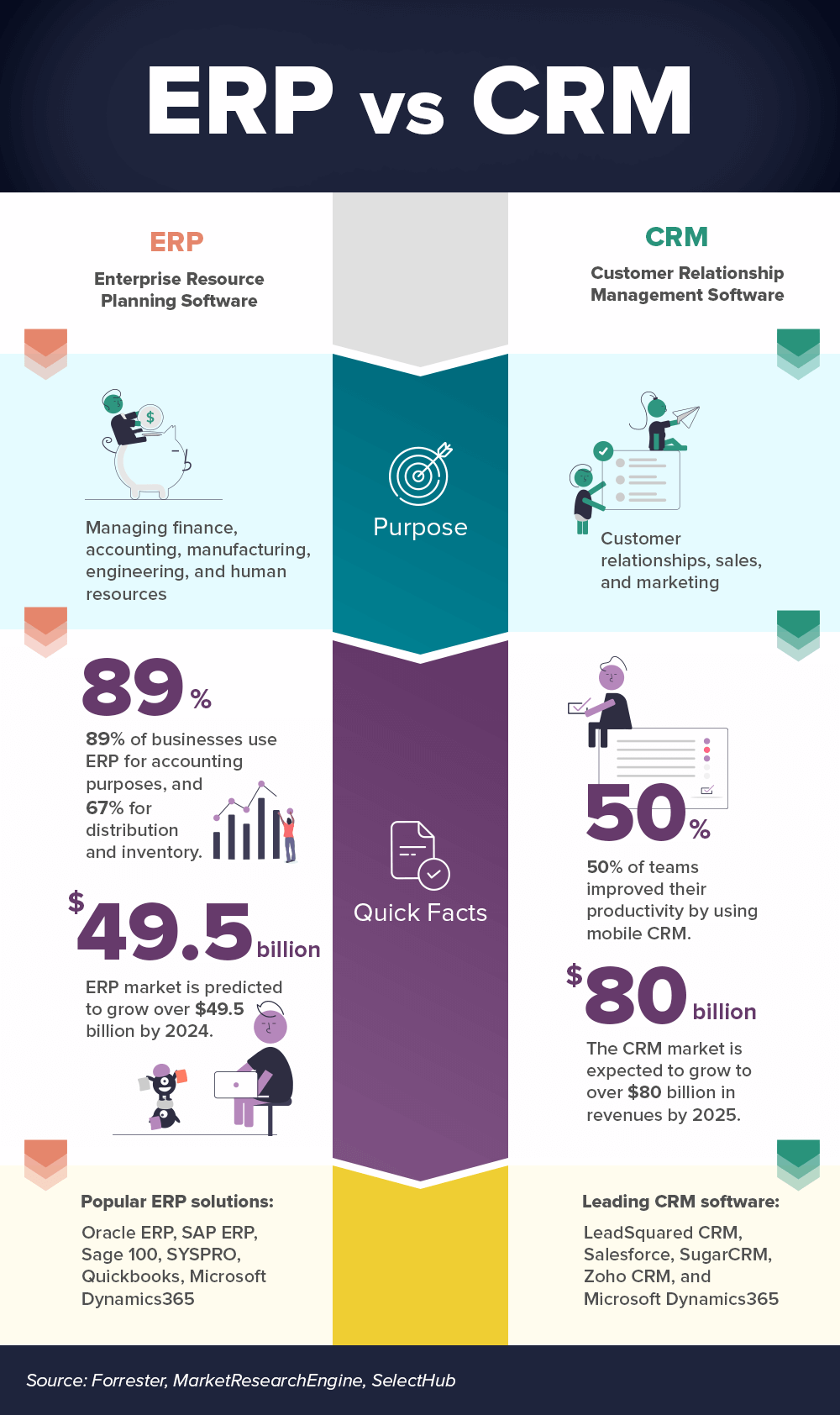
What is your verdict for ERP vs CRM? How can your business make the right choice to drive efficiency, profits, and growth?
Both CRM (Customer Relationship Management) and ERP (Enterprise Resource Planning) software offer powerful tools and features that sometimes overlap. According to Computerweekly, they are priority investments for business growth and sustainability.
Some ERP systems might even have CRM-like features in them. Yet, CRM and ERP have different principles, usage, and functionalities that define them. Identifying these differences will help you learn what they mean for your business. That way, you can choose between CRM and ERP – and whether you should integrate both.

ERP and CRM Systems
CRM Overview
CRM means Customer Relationship Management. As the name suggests, CRM systems offer features and tools to maintain good relationships with customers. You can achieve this through a consistent, high-quality, and seamless customer experience.
Currently, LeadSquared, Salesforce, SugarCRM, Zoho CRM, and Microsoft Dynamics 365 are popular CRM systems globally. Salesforce states that CRM is one of the top three tools for better customer synergy, loyalty, and marketing ROI. In reality, it is now the most prominent software market globally. Experts predict that it will grow to over $80 billion in revenues by 2025.
Nonetheless, CRM focuses on three main areas: sales, marketing, and customers. It can help teams within these departments achieve the following:
- Nurture new leads and opportunities
- Provide timely, reliable, and consistent service to transform prospects into customers
- Drive faster response times
- Build, measure, automate, and iterate marketing campaigns
- Streamline and optimize sales processes
- Analyze customer purchasing patterns including touchpoints
- Create a high-quality and dependable customer support system
- Automate repetitive and arduous tasks
- Identify cross-selling and upselling opportunities with existing customers
- Transform repeat buyers into loyal customers
What is ERP?
ERP means Enterprise Resource Planning. ERP systems offer applications for optimizing and managing manage every-day processes. It can help your business reduce labor costs and overhead. It can help you optimize business operations by centralizing data.
There are many benefits and functionalities of using ERP software. In a survey of 255 companies, 89% of businesses use ERP accounting as their most vital ERP function. Others use ERP for sales (33%), technology (21%), and distribution and inventory (67%). Also, SAP states that 96% of thriving businesses use some form of ERP solution.
The right ERP system will help you and your team achieve the following:
- Track real-time business data within and across departments
- Measure freight, transportation, and shipping needs
- Process orders, update accounts and automate alerts for billing and order fulfillment
- Manage supply and manufacturing chains
- Create alerts and reports for every step of the supply and manufacturing chain
- Track employee productivity
- Track recruitment and hiring processes
- Send notifications about company issues and how it affects the different departments
- Manage benefits, payroll, and other information of employees and consultants
- Customize project workflows for the department and enterprise-level operations
Presently, Sage 100, SYSPRO, Quickbooks are reputable ERP systems. Ultimately, ERP systems cover functions in finance, accounting, manufacturing, engineering, and human resources. No doubt, ERP has tremendous benefits. It is no wonder MarketResearchEngine predicts the ERP market will grow over $49.5 billion by 2024.
ERP vs CRM: Making the Right Choice for Your Business
Although CRM and ERP may both require similar data, their focus is entirely different. Looking at their functionalities, you could have spotted some differences already. In short:
- CRM caters to your customers, while ERP caters to your teams and operations.
- Success metrics for CRM are about customer acquisition and retention. ERP tracks goals for accounting, order procurement, vendor management, distribution timelines, etc.
- CRM systems help you boost revenue through more sales and service volumes. ERP systems help reduce overhead and operational costs.
- Customer service, marketing, and sales teams frequently use CRM systems. In sharp contrast, many people within your firm may use ERPs. It may include inventory and project managers, department heads, and leading decision-making roles.
Generally, you may have to choose between CRM and ERP. Your choice will depend on three critical factors:
- The size of your business
- The scale of your business
- The complexity of your business processes
For instance, smaller businesses may choose CRM systems to grow their customer base. In contrast, complex organizations choose ERP systems to cut operational costs and maximize ROI. Thus, your IT capacity, current, and future needs may also influence your choices. You might choose an ERP system to streamline processes. Or perhaps replace existing non-integrated applications. Other businesses with a focus on their customers and want to sync sales and marketing functions may choose CRM systems.
What About Using Both CRM and ERP Systems
Now, this brings us to a third choice – using both systems. You can choose to use both CRM and ERP to enjoy their extensive benefits. ERP will help you streamline operations. It can also help you generate cohesive data and enjoy cost and time savings. CRM will help you target both prospects and existing customers. Altogether, you can eliminate friction and achieve a better end-to-end customer experience.
Nonetheless, CRM and ERP systems sometimes require similar data. Therefore, using separate and siloed systems can be potentially dangerous to your business. For instance, erroneous customer data can directly trigger low customer satisfaction. In turn, this might lead to the loss of that customer and even drive a lousy business reputation. Both systems also have complex architectures. Your team will have too many difficulties using both platforms as separate entities.

To avoid this problem, we recommend ERP and CRM integration. That way, you cannot just enjoy the different benefits that both systems bring to you, but these as well:
- Ability to make better decisions backed by accurate and more in-depth data insights
- Streamlined communication and collaboration across teams and departments
- Automate processes so your teams can focus more on innovation and creativity
- Informed resource allocation to help optimize projects proactively instead of reactively
- Higher visibility into your operational costs and inventory to create accurate quotes
- Integrate customer touchpoints to deliver a seamless experience
- Leverage new technological tools to boost sales
- Use real-time data to improve performance management
- Augment physical products/services with digital products/services to eliminate silos
- Enjoy advanced analytics capabilities for better marketing and customer intelligence
- Make better forecasts and plan efficiently for the future.
Invest in an ERP/CRM Integration
No doubt that ERP and CRM integration can help make your business operations easier. But how do you choose to integrate ERP and CRM software? Begin by answering these questions:
- Will you benefit more from cutting overhead costs and streamlining business processes? Or perhaps increasing your sales volume? The first two lean towards an ERP system, while greater sales volume might mean choosing a CRM system.
- Are you looking towards a new financial system? An ERP system might be the best bet.
- What kind of integrations can your IT department handle? You should never have isolated systems for both ERP and CRM. Fortunately, many ERP vendors offer out-of-the-box functionalities that can integrate popular CRM suits. CRM vendors also provide the same. For example, LeadSquared CRM seamlessly integrates with ERP systems and several other tools that your sales and marketing folks use. However, some businesses might still require custom code to ensure seamless integration.
- Have your customer management and ERP’s sales functionality already met your business needs? You may already have an ERP system in place. If the answer to this question is no, then you need to evaluate the best CRM vendor for you. If you cannot find a CRM vendor that meets all your needs, you need both CRM and ERP systems to bridge the gap.
- What is your overall digital strategy? Are you pursuing a digital transformation? If yes, your roadmap can help you define the right touchpoints for ERP and CRM systems. However, if you want to automate sales and marketing, then a CRM system might be enough as a full ERP with many modules might be a waste.
Concluding Thoughts
Are you stuck with ERP vs CRM? You don’t have to. Sure, making the right choice is challenging. We recommend an ERP/CRM integration to help you maximize the value of both systems. You will also gain comprehensive insights for growth and productivity. Remember, you don’t have to get both from the same vendor. All you must do is pay great attention to your unique needs, IT strategy, and future goals, you can make that choice.
With this approach, you mitigate risks to your business. It will also help you identify growth opportunities to maintain your competitive edge. Think about the great ways you can maximize value on existing resources. Overall, a fully integrated ERP and CRM system tailored to your business can drive your efficiency and profitability.
Further reading:
- ERP and CRM integration basics
- How to improve B2C sales?
- What is B2C CRM? How is it different from B2B CRM?
- What is pipeline CRM?
ERP vs CRM FAQs
CRM is not a part of ERP. Both are different software systems serving distinct goals. For example, ERP helps in managing operations, supply chain, and finance, CRM helps in maintaining relationships with customers through effective communications and aligning sales and marketing.
ERP: Enterprise Resource Planning
CRM: Customer Relationship Management
CRM is not a type of ERP. While the purpose of ERP is to manage finance, accounting, manufacturing, engineering, and human resources functions, CRM is to manage customer relationships, sales, and marketing activities.








